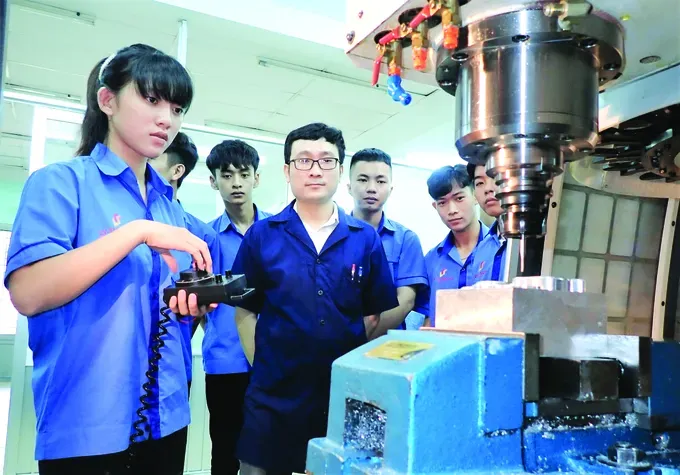
This strategic shift is seeing local colleges rapidly integrate technology into both their curriculum and administration.
At Ly Tu Trong Technical College, learning now occurs without physical limits. Vice Principal Dinh Van De highlights the use of the flipped classroom model - a teaching model where the traditional delivery of content and application of knowledge is inverted - which is a key investment in digital transformation. In this approach, instructors pre-record lectures, theory, and basic exercises as videos and share them online. Direct class time is then used for in-depth discussion, solving complex problems, and practical application, ensuring students grasp machine operating procedures via their computers even when learning remotely.
Similarly, Vien Dong College Ho Chi Minh City is adopting a flexible and technology-forward strategy. Vice Principal Phan Le Thu noted the college regularly updates its curriculum with subjects like artificial intelligence (AI), big data, and automation. The school utilizes blended learning, simulation, virtual reality, and digital learning materials to enhance teaching quality and prepare students for immediate market entry.
A number of other institutions including Cao Thang Technical College, Ho Chi Minh City College of Economics and Technology, and Thu Duc College of Technology, are now applying a standardized set of criteria for evaluating digital colleges and incorporating digital capacity training modules into their programs. These schools have built and deployed online education systems, digital management platforms, "open" educational resource portals, E-learning studios, and virtual reality labs.
Despite the progress at the local level, national digital transformation goals for the vocational sector are lagging.
According to Deputy Director Pham Vu Quoc Binh of the Department of Vocational Education – Continuing Education, the national Digital Transformation Program in Vocational Education for the 2021-2025 period, with a vision to 2030, is one of the first DX projects approved by the Prime Minister. However, after nearly three years of implementation, just over 50 percent of the nation's 1,545 vocational education institutions have successfully applied digital transformation across teacher development, curriculum, infrastructure, and management.
Deputy Director Pham Vu Quoc Binh warned that it is unlikely the 70 percent target set for the end of 2025 will be achieved.
The country currently has 71,951 vocational education teachers. However, qualifications remain uneven as only 29.9 percent hold a master’s degree, 44.5 percent have a university degree, and 8.8 percent own a college or vocational college degree. Teachers with only an intermediate qualification still account for 15 percent. Meanwhile, just over 70 percent meet vocational skills standards to teach practice at all levels, and only about half are capable of integrated teaching that combines theory with practice. These figures highlight the inconsistent quality of training across professions and institutions.
Adding to the challenge, many training programs have not been updated in time to match rapid technological advances. Equipment in numerous schools remains outdated, unsynchronized, and insufficient for the demands of high-tech professions.
Deputy Director Pham Vu Quoc Binh emphasized that schools must make strong efforts to achieve the target of 70 percent of vocational training institutions applying digital transformation in teaching and learning by the end of 2025. He added that the immediate priority is to integrate new technologies into training and management, followed by digitizing data. Each school must recognize its strengths and set clear priorities to effectively promote digital transformation.
Vice President Tran Anh Tuan of the Ho Chi Minh City Vocational Education Association commented that comprehensive digital transformation, combined with experiential learning methods, is the key to reshaping vocational education in the future. This process requires synchronous perfection in many aspects: from digital organization models, digital governance, digital activities to standardization of digital data. The key factor to creating a modern and effective training environment is investing in technology infrastructure, advanced learning and practice equipment.
























